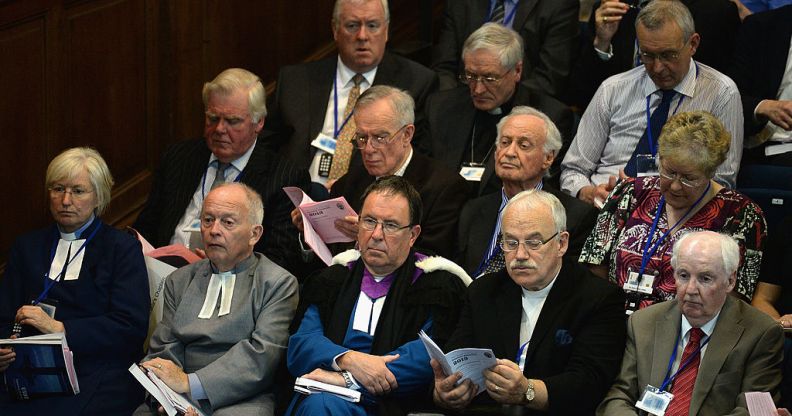Church of Scotland to vote on same-sex marriage and apologising to gay people

The Church of Scotland’s General Assembly (Getty)
The Church of Scotland may soon be performing same-sex marriages.
A report which says ministers should be allowed to conduct same-sex marriages will be debated by the Church’s General Assembly in May.
The document also states that the organisation should apologise for failing to acknowledge that gay people can also be observant Christians.
It will be presented by the Theological Forum of the Church of Scotland, an influential body which challenges the theology of the Kirk.
Last year, the Church voted to allow ministers themselves to be in same-sex marriages.
The report will “invite the Church to take stock of its history of discrimination at different levels and in different ways against gay people and to apologise individually and corporately and seek to do better.”
If voted through the Church will recognise that “we have often failed to recognise and protect the identity and Christian vocation of gay people”.
Scott Rennie, a gay minister who was appointed in 2008 – sparking a huge controversy – has welcomed the debate.
Reverend Rennie said the concept the Church could recognise its failing towards gay people was “one of the most positive and hopeful things I have read in a report to the General Assembly in many years.”
The reverend, who has repeatedly urged the Church to reconsider its opposition to same-sex marriage, added: “It recognises, at last, the diversity of people that make up the Church of Scotland, and Scotland at large.
“It says in its own theological language: you are valued; you are part of us, and we have to do better at including you – and being just in our treatment of you.”
Rev Rennie added that “loving marriages, whether they are gay or straight, can make for a good and happy life.
“Christ’s love for us, his people, is reflected in loving relationships. Marriage is something to be celebrated.
“I look forward to the day when I am able to conduct weddings for all couples, gay or straight, in the name of God.”
The General Assembly’s principal clerk, Very Rev John Chalmers, said the issue had been a long-running argument in which there would not be a sole victor.
The Church called it “constrained difference”, he said, meaning that it can make space for more than one approach.
“When mutual flourishing is what you aim for, then you try to heal where you can,” he said.
“In an argument over 20 years, some people have been hurt on both sides. Some have felt unheard, marginalised and denied.
“That is why we think the recognition that some apologies all round are needed may help promote reconciliation and help us live with our differences where they exist.”
If the debate goes well, the Church will “undertake a further study on the legal implications of conducting same-sex marriages and report back to the General Assembly in 2018.”

